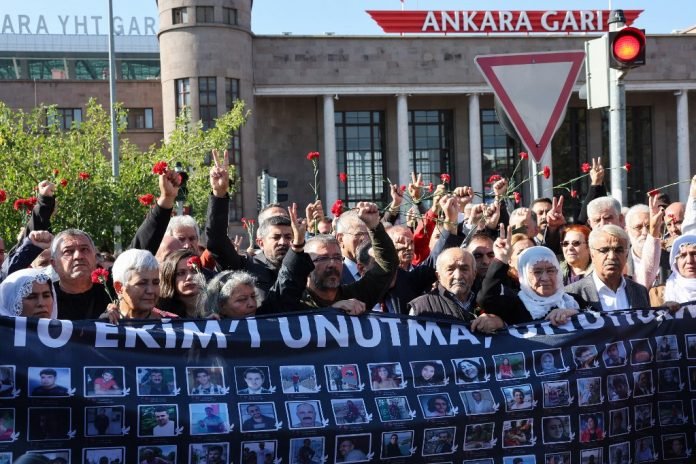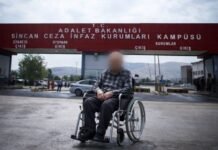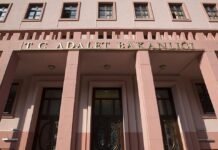
Turkey’s Constitutional Court has rejected an individual application claiming negligence by public officials in the 2015 Ankara train station bombings, the biggest terrorist attack in the history of the Turkish Republic, Turkish Minute reported on Monday, citing Deutsche Welle’s Turkish service.
Two blasts took place on Oct. 10, 2015 near the city’s central terminal as people from mainly leftist and pro-Kurdish groups gathered to stage a demonstration demanding peace and an end to the ongoing conflict between the outlawed Kurdistan Workers’ Party (PKK) and the Turkish government.
The explosions went off as people were congregating in the square, killing 103 and injuring more than 500.
A report drafted by the Interior Ministry had revealed on Feb. 25, 2016 that public officials bore some responsibility for the incident. According to the report, which was leaked to the media, intelligence that the Islamic State in Iraq and the Levant (ISIL) might stage an attack on gatherings by leftist and Kurdish groups in Ankara and other cities had been conveyed to the police. Moreover, the names of the train station bombers had also been mentioned several times in these intelligence notices.
This information, however, had not been taken into consideration by law enforcement since the Ankara Governor’s Office had not given permission for an investigation into the public officials, among them several senior staff from the Ankara Police Department. The Ankara Chief Public Prosecutor’s Office did not object to the governor’s decision, and the case was closed before it could turn into an indictment. Thus, the parties who failed to heed the intelligence warning have not been brought to justice despite demands from the victims’ lawyers.
According to DW, the top court found the individual application filed by the relatives of the 2015 massacre victims “inadmissible” on Dec. 15, addressing the application seven years after it was submitted in 2016.
The application cited not only the negligence of public officials in the massacre but also the failure to prosecute police officers who used tear gas at the site where the injured and deceased were located after the explosion. Additionally, the application pointed out shortcomings in providing emergency health services and the lack of effective investigations into these issues.
Within this context, allegations of violations of the right to life, the prohibition of ill-treatment, the right to organize meetings and demonstrations, and the prohibition of discrimination were brought before the court.
With the top court’s rejection, the domestic remedies regarding the negligence of public officials in the 2015 bombing have now been exhausted, DW said, adding that the lawyers are expected to submit an application to the European Court of Human Rights (ECtHR).
“We understand that all administrative and judicial authorities in Turkey continuously erect barriers to the clarification of the October 10 massacre. … Our struggle against the judiciary will continue,” said Senem Doğanoğlu, one of the lawyers involved in the case.
The Ankara bombings took place in the period between June and November 2015, historically the most critical timeframe of the Turkish Republic that saw a series of terrorist attacks.
Some of the previous remarks of Ahmet Davutoğlu, a former prime minister who parted ways with the ruling Justice and Development Party (AKP) and established the Future Party (GP) a few years ago, were interpreted as suggesting that some ruling party politicians had prior knowledge of the attacks or deliberately failed to prevent them so that an environment of chaos would take hold in the country, the public would be frightened and the AKP, which had lost its majority in a general election in June of that year, would be returned to power.
According to observers, that summer diverted public concern from the economy and authoritarian rule to national security, ultimately increasing public support for the AKP in November.
Following the massacre in Ankara, which took place in one of Turkey’s darkest periods, no ministers or public officials were dismissed from the government.














